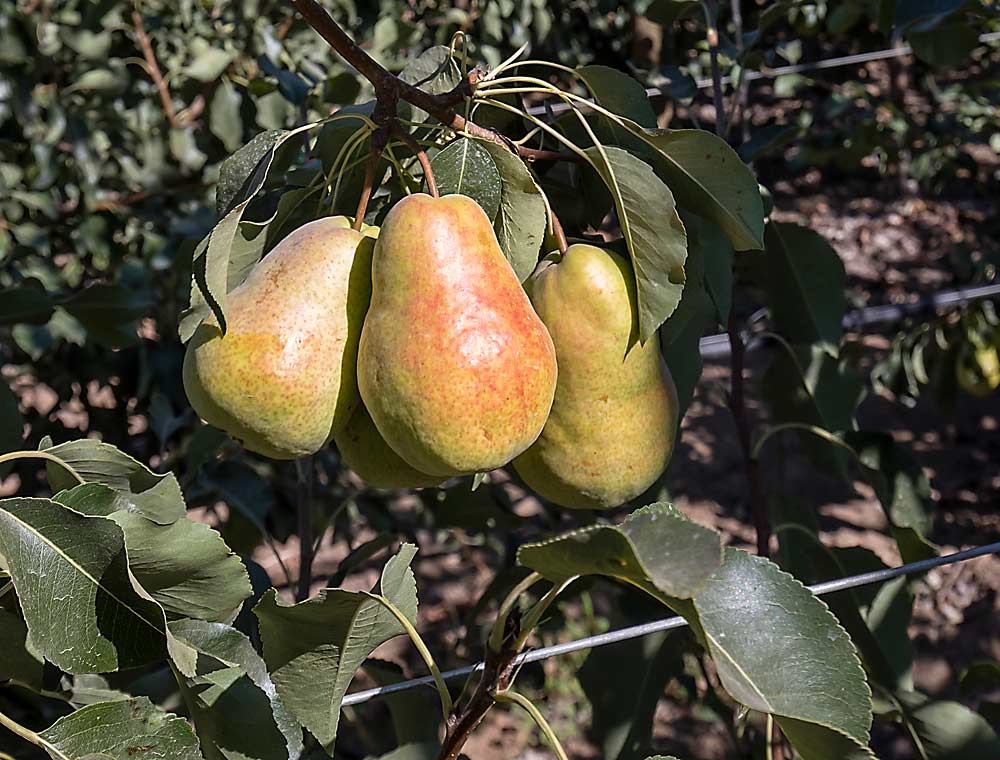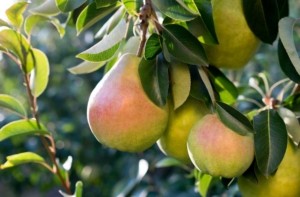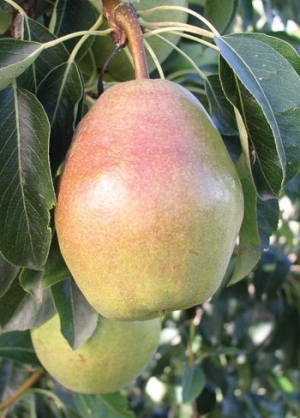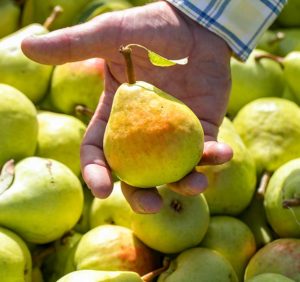
This fall, Stemilt Growers harvested its first commercial crop of the Happi Pear, launching one of the first proprietary pear marketing campaigns in the U.S.
The launch serves as a test case to see if new varieties can help to reinvigorate a long-lagging category.
“The thing that we got really excited about with Happi is that we would be able to brand a pear and market it differently than pears are marketed,” said Brianna Shales, Stemilt’s marketing director.
Unlike the apple market, the pear category remains dominated by traditional European cultivars, and consumers want to try something new, she said. And managing a proprietary pear allows for controlling quality to build demand for it.
The pear itself is not so new. The cultivar, HW 624, was bred decades ago by the Agriculture and Agri-Food Canada breeding program in Harrow, Ontario, which also produced several fire blight-resistant cultivars, including Harrow Sweet, Harrow Crisp and the Harovin Sundown, now marketed as Cold Snap. In 2013, the Vineland Research and Innovation Centre inherited the breeding program’s advance selections and began to explore opportunities for commercialization. Cold Snap began commercial promotions in Canada about five years ago, and another pear, HW 623, or Dewdrop, is under development.
“This is Canadian-bred fruit we want to showcase around the world,” said Ian Potter, Vineland’s CEO. The center also has thousands of apple selections in its breeding program, but new pears have a better opportunity to break into a less-crowded marketplace, he said. “There’s a gap on store shelves of the quality people will buy again and again. I think Cold Snap is one, Happi is definitely one, and we’re looking at if Dewdrop might be one, too.”
Vineland relies on market intelligence as it develops new varieties, Potter said, and the consistent quality, flavor and texture help the Happi Pear stand out.
“I’ve had a love-hate relationship with pears in the past, because they turn into mush,” he said. “I’ve never had a bad one of these.”
Happi Pear counts as a grandparent the Bartlett, which has a narrow window of perfect eating quality. However, Happi offers more flexibility.
“The other thing that’s really exciting is that you can eat it when it’s green and firm, because it’s sweet and flavorful, or eat it when it’s soft and yellow,” Shales said. “There’s nothing worse than a consumer coming home, waiting to eat something, and they have a bad experience.”
The texture is just a little different from Bartlett, firmer even when soft, and the sweet flavor has a hint of lemon, she added.
So far, the reception has been good, Shales said. With just 260 bins to market this year, Stemilt opted to work with a few smaller retailers to test introductions of the Happi Pear and its bright, playful purple branding.
The variety offers horticultural advantages, too, said Rob Blakey, Stemilt’s research and development director who runs extensive variety trials for the company. It has tolerance to some key pests, grows well in higher-density plantings, around 900 trees per acre, he said, and is pretty precocious.
“You don’t have to plant pears for your heirs. You can crop it like an apple, which is pretty exciting,” Blakey said. “Looking at the economics, it makes a big difference to get the orchard cropping early.”
Like a lot of other Harrow pears, Happi Pear is fire blight tolerant. It’s not resistant, but infections are less common, and strikes that do occur don’t run and spread. The cultivar also appears to be psylla tolerant, although the mechanism isn’t fully understood yet, Blakey said.
Blakey and Shales were circumspect about Stemilt’s plans to grow the program, but if growers are interested, Blakey encouraged them to reach out.
“We’re cautious, but we’re excited about it,” he said. Introducing a new pear may be a difficult proposition. “But people love good eating pears. We just have to deliver good eating pears to grow the category.”
And by and large, the pear industry is doing that with better handling of existing cultivars, he said. He sees this new branded program as part of the industrywide effort to deliver better pears to consumers and rebuild a reputation for consistent quality.
While Stemilt holds the exclusive U.S. license, Canadian growers are planting HW 624 trees as well, Potter said, and will market them under the same Happi Pear brand that Vineland and Stemilt developed together. Vineland is also working on commercializing the variety beyond North America.
—by Kate Prengaman









Leave A Comment